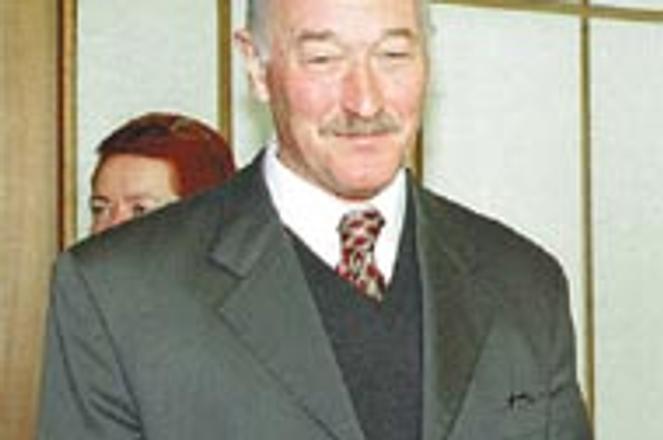Foreign Affairs Chairman František Šebej (left) with Austria's Bösch.TASR
The new cabinet has been in office a mere three weeks, but has already dispatched a legion of ministers and state secretaries to foreign capitals. The visits were intended to convince representatives of the European Union and NATO alliances that Slovakia belongs among the front-runners for integration, an assurance that political scientists say is long overdue.
"I think it's more than necessary. We have a huge debt here, inherited from [former Premier Vladimír] Mečiar's government," said Miroslav Kusý, a political scientist with Comenius University in Bratislava. "The visits are not only declarative, their aim is also to show that Slovakia is a stable country ready for an inflow of foreign capital, which was frozen during Mečiar's rein."
From November 3 to 19, fully 13 government representatives paid visits to foreign officials (see chart, page 5).
Judging from the reactions of European politicians, the form and content of the new cabinet's message has had a significant impact. Herbert Bösch, an Austrian deputy in the European Parliament and chairman of the joint EU-Slovakia parliamentary committee, visited Bratislava from November 11 to 13 and said, among other things, that the inclusion of Hungarians in the new cabinet was a "small miracle."
"Slovakia has in fact fulfilled two of the three political criteria which limited the start of negotiations with the first group of candidates for joining the EU," continued Bösch, saying he believed that pre-entry negotiations would begin in mid-January 1999.
NATO General Secretary Javier Solana is another western alliance figure who has given Slovakia's integration goals a public polish. Following a visit from Dzurinda on November 5, less than a week after the Slovak Premier had taken office, Solana said that "Slovakia will be a strong partner and the alliance will work hard in order to make up for lost time."
"I think that the situation has radically changed," said Kusý. "The new government is welcomed very cordially, as opposed to Mečiar's government, which was compromised by the series of mis-steps it made. The difference is clear."
"The verbal efforts of the previous government have been replaced by real actions," agreed Ľubomír Kubín, a political scientist with the Slovak Academy of Sciences. "The hurricane of foreign meetings and contacts has helped the new government to catch the train that the previous cabinet missed."
Kusý compared the boom in foreign junkets to the behaviour of politicians from the neighboring Czech Republic after the collapse of Václav Klaus' cabinet in 1997. While the Czechs had been trying to continue close ties formed by the former Klaus government, he explained, the new Slovak cabinet has had to begin afresh, to re-create foreign relationships torn apart during four years under Mečiar. "This is one of the reasons for the more intensive visits," he added.
Kubín agreed that the internation position of Slovakia's politicians was unique among the countries of the former eastern bloc who are now applying for western integration. "No other integration country has experienced such a process, because none of them were in the position that Slovakia is starting from," said Kubín.
But in making up for lost time, the analysts said, Slovakia is not without advantages. Sandwiched between the Czech Republic, Poland and Hungary, all of which are first-group integration candidates to NATO and the EU, Slovakia had suddenly assumed a new geopolitical importance for western alliances. "From the point of view of global strategic positions, Slovakia may not be cast aside, since it adjoins two integrating countries," Kubín explained.
With something at stake for both parties, then, the warnth of Slovakia's contacts with western officials has increased dramatically. "I can't say what the standard is, but it's obvious that it's higher than during Mečiar's reign," said Kusý, adding that history had once again started to move forward for Slovakia. "Everyday [high-level diplomatic] contacts should become natural also in the eyes of average citizen. We should stop regarding them as luxurious events and begin to accept them as an everyday reality."


